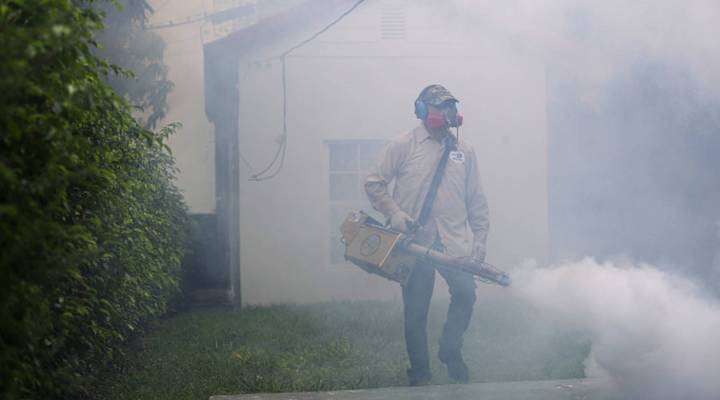
Could we have prevented Zika?

Seems like there’s a new scary disease every year—two years ago Ebola’s hemorrhagic fever and this year Zika’s misshapen baby heads. Zoonotic diseases like these have cost the world billions of dollars and millions of lives. Earlier this month, the CDC issued its first travel warning in the continental U.S for mosquito-born Zika in Miami Florida.
While Congress continues to argue about how to fund the fight against the it, those very same mosquitoes are infecting more and more people. Dr. Peter Daszak is a disease ecologist who has spent the last 20 years looking at these types of pathogens. He’s also the President of the global nonprofit, EcoHealth Alliance which has some interesting ideas about how to stop outbreaks before they start. We talked with Dr. Daszk about why these diseases are emerging and how we can get ahead of them.
On how we get ahead of get ahead of infectious diseases:
What we’re trying to do is just understand more about the problem. I mean, I think it’s crazy that we just sit here and kind of wait for these things to happen and then they hit us and we have this huge economic loss as well as mortality events, and then we respond to it. We’ve gotta get ahead of the curve on these things.
On predictive mapping:
We predict there is about 1.3 million unknown viruses that have the potential to infect people. So we produced a map, we analyzed all previous emerging diseases, this is about 500 of them; what we found are two major factors: first of all where humans are doing things to the environment more and more, and where there are lots of wildlife species that carry unknown viruses. They’re the hot spots for emerging diseases. They tend to be developing countries in the tropics but because we are so globalized these things just emerge and spread really rapidly. I just think that in 50 years time, people will look back and say, wow the end of the pandemic era, those guys really had a problem with pandemics they didn’t face up to it till then and once they did, they dealt with them.
On why he thinks, if we ignored climate change, people will actually do preventative work on pandemics:
If you look at some numbers, look we’re talking economics, 3-7.3 trillion dollars [lost] if we get a severe pandemic flu outbreak, 5-12.5 percent loss of GDP and 70-142 million deaths; that’s devastating to our global population. Climate change is going to be severe in the future but these pandemics are hitting us right here and now and you only have to look at Ebola to say that’s a complete breakdown of law and order. So I think we will deal with it.
There’s a lot happening in the world. Through it all, Marketplace is here for you.
You rely on Marketplace to break down the world’s events and tell you how it affects you in a fact-based, approachable way. We rely on your financial support to keep making that possible.
Your donation today powers the independent journalism that you rely on. For just $5/month, you can help sustain Marketplace so we can keep reporting on the things that matter to you.


















